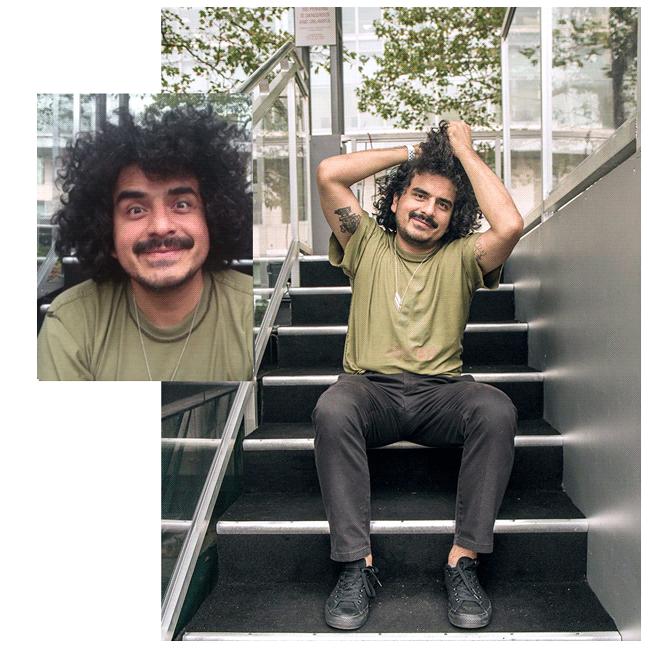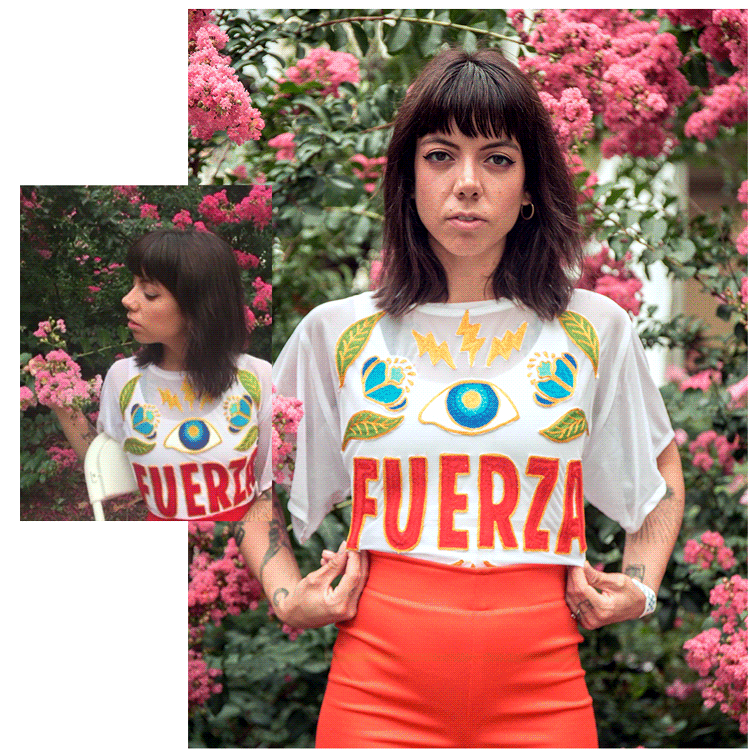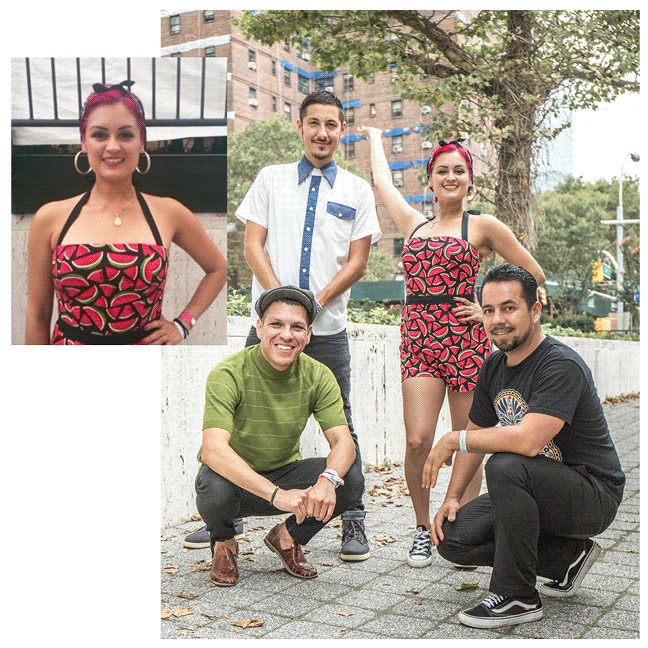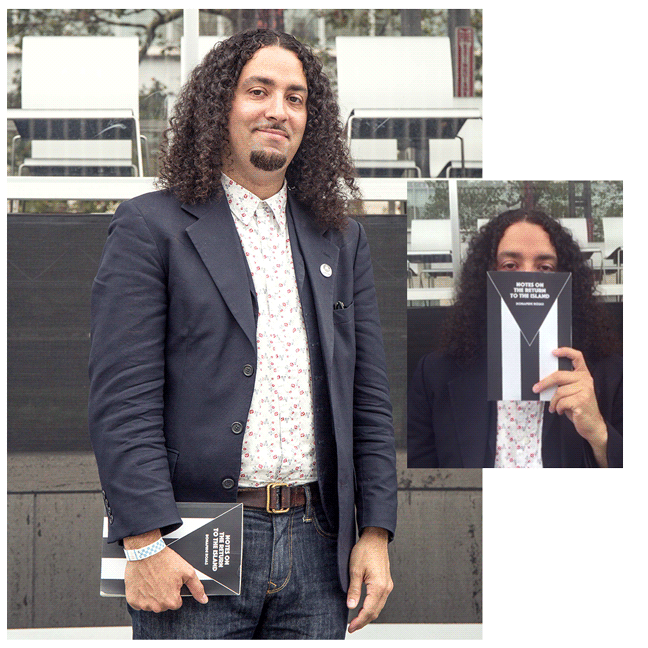At Nosotros Fest, Latino Artists Transcend Tokenization & Create a Space That’s All Their Own

Photo by Itzel Alejandra Martinez for Remezcla
The second installment of Nosotros Fest, New York City’s radical gathering of music and arts, went down last week in Damrosch Park at New York City’s famed Lincoln Center. The brainchild of Hurray For The Riff Raff frontwoman Alynda Segarra was by all means a success, filling the center’s major outdoor concert space and bringing an uncompromising, sponsor-free message of empowerment and social awareness. Many of the artists on the stage highlighted the distinct and unusual honor of performing at Lincoln Center, underscoring the compound’s legacy as an international beacon of fine arts, as well as its history as a space traditionally patronized by Anglo audiences.
Musicians and poets hit the stage in rapid-fire sequence to deliver their own unique brand of art, suffrage, and fun. Xenia Rubinos and Helado Negro got the crowd singing and bouncing, while headliners Hurray for The Riff Raff and Las Cafeteras assembled a gathering of loyal cheering who danced all through their sets.
But some of the most special, scene-stealing moments came from the bevy of poets that graced the stage. Bonafide Rojas kickstarted the event reading selections from his latest collection Notes On The Return To The Island, where he broached the complexities of the Nuyorican experience as well as Puerto Rico’s ongoing economic woes as an embattled U.S. colony. Nuyorican Poets Café stalwart La Bruja dropped her eloquent knowledge on a spellbound crowd. Her final recitation of her acronym poem “S.P.I.C.” garnered loud cheers and laughter from the audience especially with her final incantation “Sexy. Pero. Inteligente. Coño.”
Of course, the headlining poet was none other that Young Lords icon Felipe Luciano, who kept his remarks short, but delivered a powerful set of poems that stunned the audience into quiet contemplation. His first piece was a schoolyard metaphor for the obscene indignities the Trump administration has showered on the world, while his second was a passionate cry for his long-deceased friend Tato who showed him the beauty and flaws of Puerto Rican history and identity.
All in all, Nosotros Fest has made its mark as an inclusive and necessary space for Latinx voices. It’s still new, but Alynda Segarra’s baby is growing and gaining the kind of attention it deserves. With the spirit of community and camaraderie in the air, we spoke to some of the artists performing at Nosotros Fest to get their input on why the festival matters and their hopes for the future of Latino communities. –Richard Villegas
Additional reporting by Music Editor Isabelia Herrera.
Xenia Rubinos
Why did you decide to perform at Nosotros Fest this year?
Alynda from Hurray from the Riff Raff invited me in the fall when she first did Nosotros Fest and I couldn’t make it. I was in Europe on tour, and I was really bummed because it sounded like the kind of thing I’d always wanted to do. Roberto [Carlos Lange] from Helado Negro and I had talked about doing something similar to this, maybe presenting a different view of Latinos making music and not necessarily specific to Latin music, but people who are Latinx making work and showing a different side of that. And I felt like that’s what Alynda was doing and I really wanted to be a part of it.
How is Nosotros Fest different from other festivals you’ve played?
It’s not about any brand, and not about selling anything other than music and poetry, presenting this work by people who happen to be Latino. So I think it’s a really unique propuesta, because a lot of times I get invited to play many different events across many different scenes and I find that – particularly in the Latino scene – things can be tokenized very quickly. I’ll end up playing “Chiquita Banana Latino Saturday Night” in Iowa at some museum, or sometimes it surprises you and it’s a little more subtle, but you get there and you’re like, “Wow I feel really tokenized right now.” I get that it’s intricate and that there are lots of moving parts to those kinds of events, so I appreciate [Nosotros] as a unique opportunity because it’s not about anything else other than presenting work.
What do you hope to see change for Latinx communities in the future?
Thinking about the U.S., it would be nice to feel like we own something here. I don’t have a sense that we own much of anything in the U.S., and we are constantly reminded that we’re not from here, that we’re not invited, that we’re just visiting or that we’re not really American. So it would be cool to feel that the Latino community in the U.S. could have ownership of the things they contribute to, so that it’s not just a workforce or immigrants who happen to be here. But we’re also the people who built this country; we have a history here. It would be nice to learn about our history in this country, which only now is it really being documented and talked about. And then the next step would be to own the things that we create. The music that we make, the art that we make, and to have an identity that shows solidarity between our communities.
Helado Negro
Why did you decide to perform at Nosotros Fest this year?
Having Felipe Luciano encouraged [me] to participate in this is really cool, because he’s an older cat. I knew about the Young Lords but I didn’t know about all the participants and movers and shakers within it, and so it’s cool because you get to learn a little bit of New York history in that respect and then in a national sense. To give them a platform like this, it’s a bunch of young people doing whatever they’re doing right now and then he is up there talking about what he was doing when he was young.
How is Nosotros Fest different from other festivals you’ve played?
It’s a free show. It’s in the middle of New York City. I think Alynda’s story is really cool, the way she’s come to her own awareness of her roots. That story is a lot about Nosotros, her wanting to use what she has to put everything together. That’s one of the main reasons I wanted to participate, because she is digging into it and wanting to provide and support and uplift people.
What do you hope to see change for Latinx communities in the future?
Where I grew up it wasn’t something you thought about all the time. People just did what they did and participated because we all had similar backgrounds; we all had this Latinx identity. I think now there is a hyperawareness of it, so it’s kind of understandable how people want to commodify ideas and aspects, but the thing is being careful, so that shit doesn’t turn into something boring. It can become something that is easy to sell…Then it becomes a moment in time and less about building on something that can sustain people who want to keep doing this.
Hurray for the Riff Raff
How is Nosotros Fest different from other festivals or events dedicated to uplifting Latino artists? What does Nosotros Fest offer as a platform?
I am hoping to make Nosotros unique by focusing on artists who are outspoken politically. I have been very inspired by Afropunk and felt like Latinx rebels, artists, and thinkers needed a space that honors them. We leave respectability politics and the white gaze at the door. These are desperate times and Nosotros is about speaking truth to our people.
What do you hope to see change for Latinx communities in the future?
Personally I must find a way to stand up for our undocumented friends and family who are being terrorized by this administration and ICE raids. There are many amazing organizations and people who are doing this work; we must continue it. We must send a message to the country that says we are watching. We will not allow them to be taken away.
Las Cafeteras
Why did you decide to perform at Nosotros Fest this year?
Hector Flores: We all met playing in Kansas City playing a festival with Hurray for the Riff Raff and Making Movies. We all respected each other and admired each other’s work, but playing together was a really magical experience and we felt like we should do this again some time. Alynda really spearheaded that. She said she wanted to create something that really represents this magic that we are doing and really puts music in the context of the movement, and this is the second time that she’s asked us and we’re hella honored.
Daniel French: It’s musicians building with musicians, saying, “I respect what you do, let’s find an excuse or reason to do stuff and make it meaningful beyond just hanging out.”
How is Nosotros Fest different from other festivals you’ve played?
Jose Cano: There’s something really special about playing each other’s festivals in Kansas City, New York, and Los Angeles, and Making Movies and Ride have been a part of that. It’s camaraderie between bands that are making beautiful music, very different music, but music that has lots to say about social justice. It’s a really nice thing to be able to support each other, at a beautiful place like Lincoln Center. It’s really magical.
Denise Carlos: It’s our role as artists to make the revolution irresistible. I think a lot of times we don’t need to create change by being angry or fighting or being distressed, but instead creating these spaces where people feel powerful in a way that is joyous, that you feel like you can smile during the process of deconstructing and reconstructing a more beautiful space for yourself. Spaces where women are the center point of these conversations. I appreciate that as a woman, as an artist. Most festivals, I don’t see women being lead singers or running the show, and that’s important to me and I think it needs to be said out loud.
What do you hope to see change for Latinx communities in the future?
Daniel: I remember when I was growing up and the way I viewed myself. And I reflect back on not feeling good enough or smart enough compared to white folks. It’s taken me a good part of my life to really believe in myself, so one of the things that I would really like to see change is for people of color, women, and boys and girls to really believe they are special and powerful so folks coming up don’t have to struggle the way I did.
Jose: There are so many painful things that have happened to us in recent generations that we stopped telling our stories. I hope that we can go back to those stories and learn, and pass that knowledge onto our kids. I’m talking about the details of the places you come from, not just Mexico, but where your ancestors come from. And like Denise said, finding the creative, uplifting ways to share it that takes us to the imaginary place where we can have fun. Before you know it, your imagination is happening. Someone imagined this building. Alynda imagined this festival. Now it’s all real.
Bonafide Rojas
Why did you decide to perform at Nosotros Fest this year?
I actually did the one down at Bowery [Ballroom] last year. Alynda and I had actually talked about it before she even started doing this. It’s a rare thing for a musician who theoretically isn’t known for cosas políticas. She’s doing American music, and all of a sudden she becomes politically and spiritually awakened and uses that platform to expose non-mainstream artists to a bigger scale, which I think is commendable. That’s one of the best things about Nosotros, especially last year where you had Dowtown Boys and Making Movies, bands the audience may not have necessarily gone out to see otherwise. It’s the same here at Lincoln Center; it’s my second time here but first time on the big stage, and you have Las Cafeteras and La Bruja and Felipe [Luciano] and Helado Negro, which is a pretty eclectic mix. The best part about it is that since we are in New York, it’s not a Puerto Rican-heavy mix. I think it’s a big Latinx lineup that benefits everybody.
How is Nosotros Fest different from other festivals you’ve played?
The best part about is that if one of the performers cracks a joke about your little Latina mom, everyone in the audience might get it. Those kinds of things are a camaraderie that Latinx people understand. If I was the only Puerto Rican on the entire white roster, I could talk about certain things, but not about being Puerto Rican. And that’s the beauty of this. [Nosotros] is intergenerational and multiethnic, which I think most festivals should do, but don’t.
What do you hope to see change for Latinx communities in the future?
What Nosotros creates for Latinx artists – as a festival and in terms of what can bloom out of it – is a bigger establishment taking risks and chances with more Latino based lineups. But I also want us to have our own spaces. The fact that it’s our own, and that we know who is curating, who put it all together, is the best part about it. Alynda definitely picked these people specifically.
I also think that even when you decompartmentalize every country, you know, from Mexicans to chilenos, Argentinians, Cubans, and Dominicans, they all need something on a smaller scale to then come together on a larger scale. I don’t think it’s a bad thing to celebrate our ethnic heritage. I think it’s necessary, even in terms of celebrating it before we celebrate Latinx, because sometimes people get lost in the shuffle.




